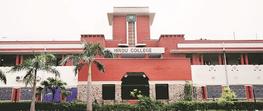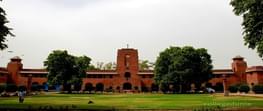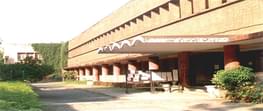Prof. Balaram Pani is presently serving as Dean of Colleges at University of Delhi. He is also holding charge of Director, Campus of Open Learning, University of Delhi. He is also leading Bhaskaracharya College of Applied Sciences, University of Delhi as Principal since last seven years and has more than 25 years of teaching experience. He has published more than 50 research articles in reputed journals and authored 20 books. He has supervised 08 research scholars for Ph.D./M.Phil/Post Doc. work. He has handled several projects of more than Rs 1.25 crore research grants. He has worked for the upliftment of the education sector through his diverse experience and expertise.

What are the key factors that keep you connected with the education sector?
“Commendable work for society at large”
Education is a field where one can get complete job satisfaction by interacting with different students, colleagues and learning enthusiasts. Inspired by Swami Vivekananda, I firmly believe that Education is the only tool which has influence over all aspects of life such as social, economical, political, spiritual, emotional, psychological etc. One can educate the nature, behaviour and character of the people through education which ultimately helps nation building and prosperity.
What is your philosophy of leadership?
“Establishing a wholesome working culture for maximum outputs”
Leadership means taking all together towards the mission of the institute. I always believe in an open door and flexible policy to accommodate all as far as possible. No discrimination of whatsoever is followed by always taking the rule book. Transparency, healthy relation and working environment has to be created to bring confidence among the staff members. The simple administrative strategy is to assign work on the basis of one’s interest and abilities and fixed responsibilities.
What can an inbound student gain from studying here in your university?
“A dynamic and well-built learning environment”
Every institute is different. One can always find something new in every institute. University of Delhi is a place where you can find an environment conducive for your studies supported by the latest technology and infrastructure. University of Delhi has world renowned faculties of their respective fields and students can get affordable education here. We are recognized as an Institute for excellence in teaching, research and outreach; nurture their talent, promote intellectual growth and shape their personal development and serve humanity through the creation of well-rounded, multi-skilled and socially responsible global citizens.
Check Delhi University Courses & Fees
How does the curriculum of Delhi University ensure the best practice of industry?
“Regular analysis and feedback mechanism”
DU has a Learning Outcome based curriculum framework. Due feedback as well as suggestions were taken from all stakeholders before its implementation. Further, regular feedback is required from Students, Parents, Teachers, Alumni and Industry after every semester for consideration. It also gives an opportunity for an immediate revision based on it. Every course has a Skill Enhancement paper to cater industrial orientation.
What do you think should be the University’s top priority over the next 10 years?
“Improvement in overall academic and structural framework”
Our priority includes effective implementation of National Education Policy 2020. New skill based, entrepreneurship and job creating curriculum to be introduced more rigorously. Research culture to serve the society especially in the field of environment is of utmost importance. Health care mechanism for the staff and students is another major area where we are aiming to improve upon. Regularisation of over 5000 teaching posts will definitely help to achieve this target. University aspires to achieve world ranking in top 100 universities. We are also aiming to have a functional East & West campus of the University.
How has your vision for the University evolved over time?
“Keeping latest updates in terms of practical aspects of learning”
Earlier, holistic growth of the university was on priority which included promotions of the teaching and non-teaching staff of the university, recruitments of staff, filling of various administrative posts, etc. We have registered MOUs with various organisations for exchange of know-how, recognition of the university at the world level via different rankings. We have also revived the Teachers’ Welfare Fund which was dormant for many years. Recently, promotion to senior professor at the University level and professor at the college level is being introduced to avoid any stagnation in the academic growth. This will motivate them to grab the upcoming opportunities in their respective careers. Now the next is to create a skill enhancement based and employment or entrepreneurship generating curriculum, placement of our students, reaching to the marginalised section of the society, expansion of the University campuses in East Delhi and West Delhi. Also, MOU with ICCR to create a centre for catering to the requirements of overseas students with ICCR scholarships, creation of health infrastructure for stakeholders are next steps to accomplish.
What do you see as Delhi University’s greatest strengths?
“Recognition by various ranking and grading agencies worldwide”
The University has shown its resilience and ability to adapt and convert a challenging situation to an opportunity. The University has maintained its position at the top in the country as per the Centre for World University Ranking (CWUR) ranking and is 8th in the National Institutional Ranking Framework. It is also among the top 10 Indian public educational institutions and universities, and the first among Indian public universities under QS BRICS University Rankings. The h-index of the University has touched more than 200 and is the highest among Indian universities. We are ranked first in INDIA and 71st in the ASIA ranking.
Click Delhi University Placement
What plans are you designing for your University’s students?
“More advanced curriculum and global collaborations”
Traditional classrooms, where teaching and learning transacted, have been completely replaced by online platforms, many opportunities have come up to create online MOOCs courses. This enables them to take the subject expertise to the remote area and also in the regional languages. Common entrance examinations to save time and resources, incubation cells in colleges, MoUs with International universities for smooth transfer of credits, research activities etc. are some plans for international affairs.

![Delhi University - [DU]](https://image-static.collegedunia.com/public/college_data/images/logos/1491817267UniversityofDelhi.png?h=71.7&w=71.7&mode=stretch)
.png?h=132&w=263&mode=stretch)
.png?h=132&w=263&mode=stretch)
.png?h=132&w=263&mode=stretch)



.png?h=78&w=78&mode=stretch)
.png?h=78&w=78&mode=stretch)
.png?h=78&w=78&mode=stretch)






![Kirori Mal College - [KMC]](https://image-static.collegedunia.com/public/college_data/images/appImage/14918925121444136740KMCNEW.jpg?h=111.44&w=263&mode=stretch)

![Jesus and Mary College - [JMC]](https://image-static.collegedunia.com/public/college_data/images/appImage/14918878411444051059JMCNEW.jpg?h=111.44&w=263&mode=stretch)

![Indraprastha College for Women - [IP]](https://image-static.collegedunia.com/public/college_data/images/appImage/1999_IPCG_APP.jpg?h=111.44&w=263&mode=stretch)













![Aditi Mahavidyalaya - [AMV]](https://image-static.collegedunia.com/public/college_data/images/logos/1491907072logo.png?h=72&w=72&mode=stretch)
![Atma Ram Sanatan Dharma College - [ARSD]](https://image-static.collegedunia.com/public/college_data/images/logos/1491912596logo.png?h=72&w=72&mode=stretch)
![Bhagini Nivedita College - [BNC]](https://image-static.collegedunia.com/public/college_data/images/logos/1395655310Bhagini Nivedita College.png?h=72&w=72&mode=stretch)
![Bharati College - [BC]](https://image-static.collegedunia.com/public/college_data/images/logos/1395656554Bharati College.png?h=72&w=72&mode=stretch)
![Dr. Bhim Rao Ambedkar College - [BRAC]](https://image-static.collegedunia.com/public/college_data/images/logos/1492411231logo.png?h=72&w=72&mode=stretch)
![College of Vocational Studies - [CVS]](https://image-static.collegedunia.com/public/college_data/images/logos/1492415426logo.png?h=72&w=72&mode=stretch)
![Daulat Ram College - [DRC]](https://image-static.collegedunia.com/public/college_data/images/logos/1507912339daulatramcollegelogo.png?h=72&w=72&mode=stretch)

![Delhi College of Arts and Commerce - [DCAC]](https://image-static.collegedunia.com/public/college_data/images/logos/1491999035logo1.jpg?h=72&w=72&mode=stretch)
![Delhi School of Economics, University of Delhi - [DSE]](https://image-static.collegedunia.com/public/college_data/images/logos/1703734276mbadsebacombined1.png?h=72&w=72&mode=stretch)
.png?h=72&w=72&mode=stretch)
.png?h=72&w=72&mode=stretch)
.png?h=72&w=72&mode=stretch)



.png?h=72&w=72&mode=stretch)
.png?h=72&w=72&mode=stretch)





![Department of Business Economics, University of Delhi - [DBE]](https://image-static.collegedunia.com/public/college_data/images/logos/1425462742Capture.jpg?h=72&w=72&mode=stretch)
![University of Delhi, Department of Financial Studies - [DFS]](https://image-static.collegedunia.com/public/college_data/images/logos/1690192927Untitled.jpg?h=72&w=72&mode=stretch)


![Cluster Innovation Centre , Delhi University - [CIC]](https://image-static.collegedunia.com/public/college_data/images/logos/1555740831Logo.jpeg?h=72&w=72&mode=stretch)


![Guru Gobind Singh Indraprastha University - [GGSIPU]](https://image-static.collegedunia.com/public/college_data/images/logos/1464869465LOGO.png?h=72&w=72&mode=stretch)
![Delhi Technological University - [DTU]](https://image-static.collegedunia.com/public/college_data/images/logos/1437567677logo.jpg?h=72&w=72&mode=stretch)

![Banaras Hindu University - [BHU]](https://image-static.collegedunia.com/public/college_data/images/logos/1434627772BHU.jpg?h=72&w=72&mode=stretch)
![Hansraj College - [HRC]](https://image-static.collegedunia.com/public/college_data/images/logos/1491982583logo..png?h=72&w=72&mode=stretch)
![Gargi College - [GC]](https://image-static.collegedunia.com/public/college_data/images/logos/1506399496zsdmnnmnmsdfdf.png?h=72&w=72&mode=stretch)
![Babasaheb Bhimrao Ambedkar University - [BBAU]](https://image-static.collegedunia.com/public/college_data/images/logos/1485518600logo1.jpg?h=72&w=72&mode=stretch)
![Galgotias University - [GU]](https://image-static.collegedunia.com/public/college_data/images/logos/1593772670logo.jpg?h=72&w=72&mode=stretch)
![School of Open Learning, University of Delhi - [SOLDU]](https://image-static.collegedunia.com/public/college_data/images/logos/1559890399logo2.jpg?h=72&w=72&mode=stretch)
![Ambedkar University Delhi - [AUD]](https://image-static.collegedunia.com/public/college_data/images/logos/1420869990dr. ambedker.jpg?h=72&w=72&mode=stretch)
![Jamia Millia Islamia University-[JMI]](https://image-static.collegedunia.com/public/college_data/images/logos/1491558776logo.jpg?h=72&w=72&mode=stretch)
![Lady Shri Ram College for Women - [LSR]](https://image-static.collegedunia.com/public/college_data/images/logos/1559556886lsrlogo9.jpg?h=72&w=72&mode=stretch)

![Jawaharlal Nehru University - [JNU]](https://image-static.collegedunia.com/public/college_data/images/logos/14915691701461581754JawaharlalNehruUniversitylogo.jpg?h=72&w=72&mode=stretch)



Comments